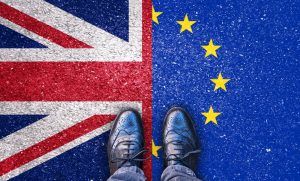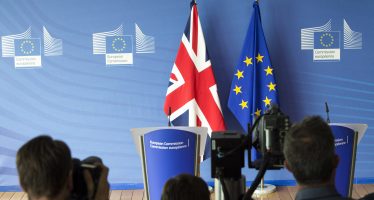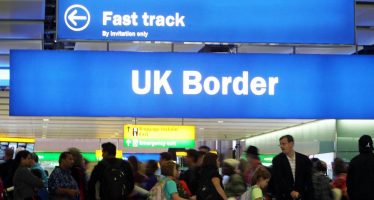Project Fear

After suffering some initial and minor difficulties, they fully expect the UK to become the shining star of a new world order – an Empire 2.0 – a low to no regulation haven of free enterprise, free trade, and free beer. No, that last one was made up; but listening to Brexiters explaining the marvels of life outside the EU realm, the idea takes hold that all of the world’s ills, and most certainly those that afflict the UK, share a common denominator – one found in the reportedly drab, wet, and boring capital of Belgium where the sovereignty-devouring beast resides, gobbling up nations and extinguishing their unique traits.
Even though the UK remains, for now, a full member of the European Union – as of yet, nothing has changed – Brexiters jump on any morsel of good news to proclaim their intellectual and moral superiority over the experts, denouncing their Project Fear as the work of scaremongers and traitors. The fact that no economist of any repute is willing or able to predict a favourable outcome of the exercise is hailed as definitive proof that the informed opinion of anyone with more than a few O Levels to their name is not to be trusted.
In the run-up to the June 23, 2016, Brexit referendum, the well-oiled leave campaign shunned economics, appealing instead to emotion: who wants to be ruled from – of all places – Belgium by bureaucrats earning a small fortune to ponder the curvature of bananas? Reason never came into play as EU myths proliferated, lies became alt-truths, and fake news ruled the airwaves. Against this onslaught, the remain campaign did little more than preach caution and warn of grave dangers – Project Fear.
“Turning your back to the world’s largest and most prosperous bloc of nations – and exiting its 50+ FTAs – cannot produce beneficial results.”
So far, Brexiters have proved a resilient lot, brushing off setbacks, such as the exit payment nobody considered before the vote, as minor inconveniences caused by resentful continentals, trembling at the mere thought of a successful post-Brexit UK. The script for when reality hits, as it inevitably must, is already written and well-rehearsed: any trouble experienced after the country’s departure from the union is to be squarely blamed on vengeful and small-minded Eurocrats who, as pitiful foreigners, cannot be expected to have a developed sense of fair play.
Hungarian-born humourist George Mikes (1912-1987) who dissected life in his adopted country in How to Be a Brit, noted: “The British are a brave people. They can face anything, except reality.” The author was also eerily prescient when he concluded (in the late 1940s) that: “In England it is bad manners to be clever, to assert something confidently. It may be your own personal view that two and two make four, but you must not state it in a self-assured way, because this is a democratic country and others may be of a different opinion.”
Thus it came to be that the experts lost out. It just so happens that public opinion begs to differ and bravely ignores reality. The remain campaign’s most-damning mistake was to focus on economic minutiae as opposed to the bigger picture. Brexiters’ assertion that the UK, once outside the EU, is free to trade with the world and seal its own trade deals is easily dismissed by pointing out the fact that the EU already has well over fifty full free trade agreements (FTAs) in place with third countries and is preparing another forty or so. In other words: on its own, the UK has some catching up to do – the country is already now able to trade freely on a truly global scale. However, Brexiters cannot really be bothered with such simple facts since they do not conform to their strongly-held views.
Turning your back to the world’s largest and most prosperous bloc of nations – and exiting its 50+ FTAs – cannot produce beneficial results. All other metrics derive from this simple statement: the impact on the City, the Irish border, the UK’s position in the world, the country’s multiple and alarming deficits – all are derived from the reality that, before long, the UK will stand on its own in a very large and not always friendly world. That is the real Project Fear. It matters little that the UK may, for now, consider itself one of the world’s larger economies; compared to the other big boys – the US, China, India, and the EU – it is a rather smallish market and, shortly, an island gateway to nowhere.
Moreover, Brexit comes – as major events usually do – at a most inopportune moment in time. Due to its aversion the fiscal probity, the UK is caught up in a counter-cyclical movement that sees the country battling multiple deficits just as the economy enters its post-boom phase. As the economies of mainland Europe barrel ahead, boosted by a re-established fiscal equilibrium and shrunken debt loads, the UK finds itself spending busloads (with apologies for the irresistible pun) of money it doesn’t quite have.
Even after numerous cutbacks, the budget is still far from balanced and remains in the red to the tune of 3% of GDP. Gross government debt borders 90% of GDP, leaving little room for large-scale interventions to meet or counter any economic setbacks. The picture is particularly stark when compared to the upswing taking place on the continent where – with only a few exceptions (France, Spain) – budgets are fairly balanced, with surpluses in a number of key economies such as Germany, The Netherlands, and Sweden. Debts loads have also lightened significantly and remain on a downward trend. Most disconcertingly, the UK has so far not managed to tackle its outsized trade deficit which, despite the slump in the pound’s value, still amounts to a whopping $171bn. The wider and much more significant current account deficit, whilst shrinking slowly, now hovers around $130bn, or 4% of GDP, emphasising the UK’s continued dependence on the “kind strangers” identified by Bank of England Governor Mike Carney as the ones underwriting the country’s economy.
Meanwhile Project Fear, misnamed as it is, unfolds with GDP growth coming in significantly lower (-0.9%) than expected and shaving about £350m a week from the economy’s potential – coincidentally the exact same amount promised voters by the leave campaign as a post-Brexit windfall. An analysis commissioned by the Financial Times concluded that the government last year lost out on about £9bn in fiscal revenue due to the loss in economic output.
Within the context of accelerated global growth, the UK is fast becoming a laggard. The government is well aware of the trend and now seeks assurances from the European Union that the country’s impending exit will not disturb cross-border trade. However, the government still lacks a well-defined vision for the country it wishes to shape once the departure has been finalised, leaving EU negotiators in Brussels guessing about the UK’s true intentions. That, perhaps, is the greatest challenge: nobody seems to know what to do next. Once platitudes and jingoism are removed, Brexiters offer no vistas other than imaginary sunny uplands whilst remainers have all but given up on talking sense. Thus Project Fear becomes anybody’s guess – the less educated, the better.
You may have an interest in also reading…
Democratic Deficit
Eurosceptics often decry the European Union’s perceived democratic deficit and strenuously object to being ruled by “faceless unelected bureaucrats.” In
Border Trouble
Post-Brexit, the UK will remain part of the EU customs union and quite possibly of its single market as well.

















































































